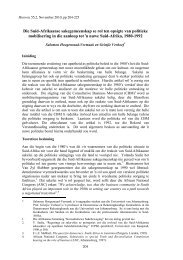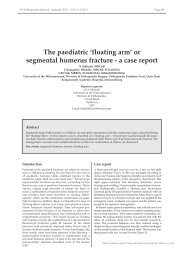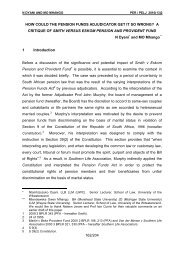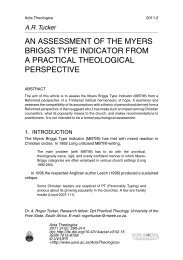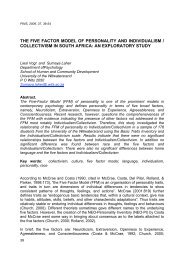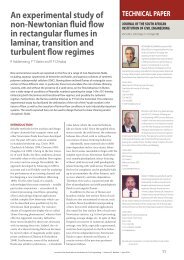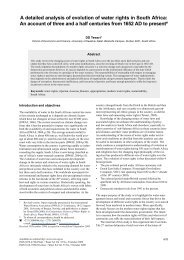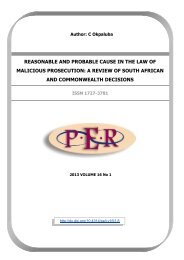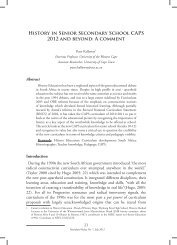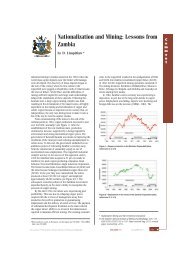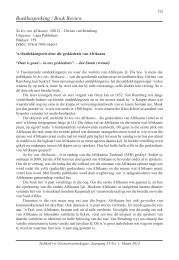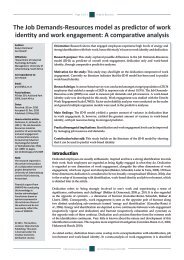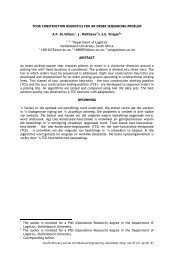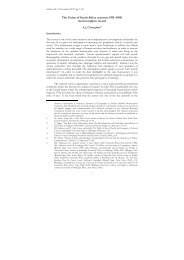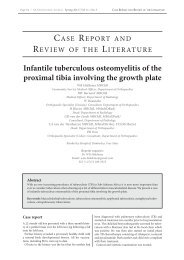91 Hendrik Verwoerd and the Leipzig School of Psychology in 1926 ...
91 Hendrik Verwoerd and the Leipzig School of Psychology in 1926 ...
91 Hendrik Verwoerd and the Leipzig School of Psychology in 1926 ...
Create successful ePaper yourself
Turn your PDF publications into a flip-book with our unique Google optimized e-Paper software.
<strong>Hendrik</strong> <strong>Verwoerd</strong> <strong>and</strong> <strong>the</strong> <strong>Leipzig</strong> <strong>School</strong> <strong>of</strong> Pscyhology<br />
tight cluster <strong>of</strong> complex qualities <strong>in</strong> which rational thoughts manifest<br />
<strong>the</strong>mselves, but <strong>the</strong>se were so dependent on <strong>the</strong>ir emotional environment<br />
that it was almost impossible to <strong>in</strong>vestigate <strong>the</strong> complex empirically. Albert<br />
Wellek, a student <strong>of</strong> Krueger’s <strong>in</strong> <strong>the</strong> 1930s, expla<strong>in</strong>ed that feel<strong>in</strong>gs lost <strong>the</strong>ir<br />
<strong>in</strong>tensity when under observation, mak<strong>in</strong>g it impossible to analyse <strong>the</strong>m. 25<br />
<strong>Verwoerd</strong>’s own position was ra<strong>the</strong>r different, because he states <strong>in</strong> his<br />
<strong>the</strong>sis that <strong>the</strong> decl<strong>in</strong><strong>in</strong>g <strong>in</strong>tensity <strong>of</strong> emotions is measurable <strong>and</strong> that<br />
emotions are open to analysis. He probably didn’t know about Krueger’s<br />
approach before he came to <strong>Leipzig</strong> s<strong>in</strong>ce he did not quote any <strong>of</strong> Krueger’s<br />
publications <strong>in</strong> his doctoral <strong>the</strong>sis.<br />
The philosopher Ernst Cassirer, a friend <strong>and</strong> colleague <strong>of</strong> <strong>the</strong><br />
Hamburg psychologist William Stern, expla<strong>in</strong>s <strong>the</strong> problematic nature <strong>of</strong> an<br />
approach like Krueger’s as follows: “Emotion can comb<strong>in</strong>e each with<br />
everyth<strong>in</strong>g; thus it cannot provide a conv<strong>in</strong>c<strong>in</strong>g explanation that certa<strong>in</strong><br />
contents comb<strong>in</strong>e with each o<strong>the</strong>r to form certa<strong>in</strong> units.” 26 The fundamental<br />
problem <strong>in</strong> his rationale is obvious from an analysis <strong>of</strong> Krueger’s numerous<br />
<strong>the</strong>oretical writ<strong>in</strong>gs. Holistic psychology contented itself with <strong>the</strong> explanation<br />
that experiences centred around emotions, but as highly complex<br />
phenomena, <strong>the</strong>se emotions were not accessible to analysis. Accord<strong>in</strong>gly, it<br />
was only possible for psychologists to isolate phenomena such as thought<br />
with<strong>in</strong> a “complex quality” at <strong>the</strong> expense <strong>of</strong> its very complexity. In Krueger’s<br />
op<strong>in</strong>ion, <strong>the</strong> decontextualisation would distort <strong>the</strong> experience to such an<br />
extent that an adequate <strong>in</strong>terpretation would be rendered impossible. The<br />
upshot was that holistic psychology drifted <strong>in</strong>to methodological paralysis <strong>and</strong><br />
amorphism. It lost <strong>the</strong> ability to be fruitful for empirical research <strong>and</strong><br />
degenerated <strong>in</strong>to an empty formula 27 that could be filled by ideological<br />
creeds <strong>in</strong>stead. Krueger’s rejection <strong>of</strong> Wundt’s mechanistic psychological<br />
elementalism led to a blanket rejection <strong>of</strong> empiricism as a “Western”<br />
approach. Krueger ma<strong>in</strong>ta<strong>in</strong>ed that empiricism dismembered “organic”<br />
relationships. He saw empiricism <strong>and</strong> positivism as English <strong>and</strong> French<br />
<strong>in</strong>tellectual traditions that were foreign to holistic German th<strong>in</strong>k<strong>in</strong>g, which<br />
was directed towards organic entities. Krueger also took this position when<br />
criticis<strong>in</strong>g Kantian epistemology for giv<strong>in</strong>g centre stage to reason <strong>in</strong> <strong>the</strong><br />
enlightenment tradition. 28<br />
Ganzheit: Schriften aus den Jahren 1<strong>91</strong>8–1940 (Spr<strong>in</strong>ger, Berl<strong>in</strong> <strong>and</strong> Heidelberg,<br />
1953), pp 147–150.<br />
25. A. Wellek, “Die Genetische Ganzheitspsychologie der <strong>Leipzig</strong>er Schule und ihre<br />
Verzweigungen. Rückblick und Ausblick”, <strong>in</strong> A. Wellek (ed.), Die Genetische<br />
Ganzheitspsychologie (Beck, München, 1954), pp 1–67, especially p 6.<br />
26. E. Cassirer, Philosophie der symbolischen Formen, vol. 1 (Wissenschaftliche<br />
Buchgesellschaft, Darmstadt 1994), p 268. Translated from <strong>the</strong> orig<strong>in</strong>al German.<br />
27. This becomes clear particularly <strong>in</strong> F. Krueger, Das Wesen der Gefühle. Entwurf<br />
e<strong>in</strong>er systematischen Theorie (Akademische Verlagsgesellschaft, <strong>Leipzig</strong>, 1929),<br />
pp 20 <strong>and</strong>. 25ff. See also Thiermann, “Zur Geschichte des <strong>Leipzig</strong>er<br />
Psychologischen Institutes”, p 153.<br />
28. U. Geuter, “Die Zerstörung wissenschaftlicher Vernunft: Felix Krueger und die<br />
<strong>Leipzig</strong>er Schule der Ganzheitspsychologie”, Psychologie Heute, April 1980, pp<br />
35–43, especially pp 37f. Krueger attempted to relativise Kant’s rationalist <strong>and</strong><br />
enlightenment stance <strong>in</strong> order to claim him for a German nationalist tradition. See<br />
98



